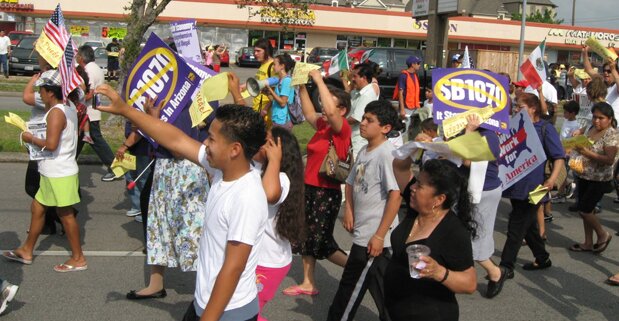Demanding to be seen and heard: Latino immigrant organizing in Houston
By Christine Kovic, Associate Professor, University of Houston-Clear Lake
On May 1, International Workers’ Day, over 7,000 people marched through the streets of Houston in a rally for immigrant reform. Flying in the face of stereotypes of undocumented migrants as being non-political, thousands demanded respect for worker and immigrant rights, family unification, an end to raids and deportations, and “liberty and justice for all.” As I walked in the march, pushing my three-year-old daughter in the stroller, people shouted “Sí se puede”, “Obama escucha, estamos en la lucha” (“Obama, listen, we are in the struggle”), and “Aquí estamos, y no nos vamos, y si nos echan nos regresamos” (“We are here, we’re not leaving, and if they throw us out, we’ll be back.”). Many men and women pushed strollers or walked with children, under signs reading “Keep our families together” or other slogans that support family unity.
The march took place in the Gulfton neighborhood on the city’s southwest side, an area populated primarily by Mexican and Central American migrants. Away from Houston’s downtown, with its huge skyscrapers that would have been empty on a Saturday afternoon, we marched past small restaurants selling tacos, pupusas, and other Central American foods; convenience stores with phone cards for calling Latin America; and small food stores with signs in Spanish. As the marchers passed parks and apartment complexes, people came out to the streets to join. The majority of the signs were handmade, with slogans denouncing a variety of injustices.
Some read, “I am the American Dream,” “immigrants are not criminals,” and “Mayflower descendant for immigration reform, we are all immigrants from somewhere.” A young girl held a sign reading “do I appear criminal because of my color?” While the majority of the protesters were Latino, a significant number of whites, African Americans, and African migrants participated in the march.
The event had been planned months in advance by over a dozen community organizations, religious groups, unions, and others. Annual marches are held in Houston on May Day, and this year the march had been planned as part of a national effort to pressure Congress to pass comprehensive and just immigration reform. Yet the big news at the last minute was Arizona’s restrictive immigration law SB 1070, which had been signed by Governor Jan Brewer just a week before the march. Rather than frightening people away, the law sparked anger and protest, and led many more to join. Populations of vulnerable migrants, particularly undocumented Latinos, are assumed to be invisible, living “in the shadows.” On this day, they were visible, vocal, and literally taking over the streets.
A small group at the sidelines protested the march itself and expressed support for Arizona’s immigration laws. Some belonged to anti-immigrant groups like the Minuteman Project and Borderwatch. At most there were perhaps fifty counter-protesters, even though they seemed to try to make themselves multiply by moving from one street corner to the next as the march passed. At one point, a small anti-immigrant contingent chanted “No you can’t,” to which the marchers responded, “Yes we can” and the exchange continued in perfect cadence as the marchers passed. The exchange was empowering for the marchers given their overwhelming strength in numbers and the force of their voices. I imagine emails circulating among the counter-protesters beginning “Houston we have a problem.”
The march itself makes visible what is commonly invisible — the thousands of migrants in Houston, the work they do, their struggles for survival, and their hopes for a better life. Perhaps better put, migrants are not invisible, society is blind and refuses to see them as full human beings. This year, the Justice for Janitors, many of whom are immigrant workers, of the Service Employees International Union (SEIU) pressured cleaning companies with large corporations for contracts to improve their jobs. On March 17, at an interfaith prayer service in downtown Houston amid the office buildings cleaned by the janitors, a group of faith leaders offered words of support and Archbishop Emeritus Joseph Fiorenza led a blessing of the brooms.
After most workers had left the skyscrapers, the janitors had to enter to clean and the rally ended. But later that night, around 10 p.m., when the janitors had finished cleaning, a vigil was held to honor their work and support their struggle. In the end the janitors won a new contract and their wages will increase to $8.35 an hour, still a pittance for the work they do. The janitors are just a small group of the thousands of migrants in Houston who work for low wages and in difficult conditions. The domestics, day laborers, construction workers, and many others literally build the city while being denied rights and respect.
Mass protests such as the May Day March are only one instance of migrants demanding their rights. More common and less visible are a variety of forms of civic and political participation from legislative campaigns for immigration reform and access to social services at the local, state and federal level; human rights documentation campaigns; unionizing and other forms of workplace organizing; tenant associations; and parent organizations at schools, among many other actions. In Houston workers, faith leaders, and community organizers successfully testified at hearings to protest the implementation of 287(g), a program which allows law enforcement agents to work directly with the Department of Homeland Security to enforce immigration law. Day laborers unite to resist not only anti-immigrant groups who harass them on street corners by taking photos but also police who refuse to allow them to search for work in public spaces.
Several slogans at the May Day rally evidence the solidarity that exists within and beyond immigrant communities. Some held signs or wore stickers stating “We’re all Arizona” or “We’re all illegals.” While the term illegal is certainly problematic – many marchers had signs or t-shirts reading “no human being is illegal” – the insistence that everyone is illegal reflects the commonalities of struggles for social justice. More than one speaker at the rally quoted Dr. Martin Luther King, Jr.: “Injustice anywhere is a threat to justice everywhere.” The rally ended with songs of struggle from Latin America, “el pueblo unido jamas será vencido,” (“the people united will never be defeated”) and a call to help clean up the park.
In the days after the march, both Democrat and Republican politicians have focused on enforcement rather than immigration reform that respects human rights while copycat laws following that of Arizona have been proposed in several states. The insistence on solidarity reframes migration as an issue of social justice rather than one of criminalization. As long as their survival and dignity are at stake, migrants and their allies will continue to mobilize and organize until justice is achieved.
###
 Christine Kovic, Associate Professor of Anthropology and Cross-Cultural Studies at the University of Houston-Clear Lake, conducts research on human rights at Mexico’s southern border in Chiapas and in Houston, Texas.
Christine Kovic, Associate Professor of Anthropology and Cross-Cultural Studies at the University of Houston-Clear Lake, conducts research on human rights at Mexico’s southern border in Chiapas and in Houston, Texas.
Author: Kirwan Institute (427 Articles)




COMMENTS